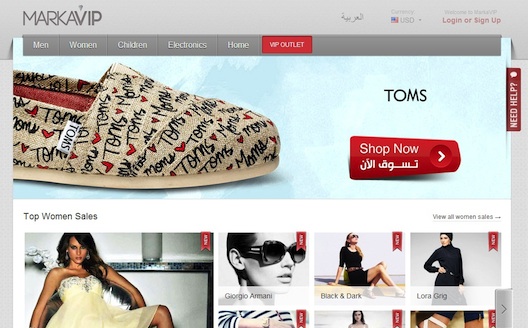MarkaVIP Announces Deal with PayPal; Will Consumers Warm to Online Payment?

 E-commerce may be one of the fastest-growing and
most promising startup sectors in the Middle East, but it still
poses several challenges. One of the biggest is the popularity of
cash-on-delivery as a payment option; a typical e-commerce company
can face up to 70% of orders over COD.
E-commerce may be one of the fastest-growing and
most promising startup sectors in the Middle East, but it still
poses several challenges. One of the biggest is the popularity of
cash-on-delivery as a payment option; a typical e-commerce company
can face up to 70% of orders over COD.
To avoid the hassle of COD, most e-commerce sites are trying to
boost rates credit card and prepaid card use. The latest to make a
move is flash sales site MarkaVIP, which has inked a new deal with
PayPal, making it the first e-commerce platform to offer a direct
billing agreement via the payment platform.
The site, which sells discounted designer apparel, accessories,
electronics and home décor in time-limited deals, will also now
offer free shipment to those using PayPal. “Literally one click of
the mouse to make a payment, and the added bonus of free shipping,
really does bring a new dimension in convenience to shopping,” said
COO Sohrab Jahanbani.
The hope is that adding free shipment will persuade customers to
get onboard with the world's biggest payment gateway. After
all, MarkaVIP's founder, Ahmed Khatib has
candidly discussed the difficulties of shipping with COD
in markets with high return rates, such as the region's biggest:
Saudi Arabia and Egypt.
Since MarkaVIP's launch in 2010, following the success of French
flash sales pioneer Vente Privée, U.S.-based Gilt Groupe, and
Turkey’s Trendyol, it's risen to become one of the Middle East’s
biggest e-commerce companies. Now, all eyes are watching to
see if the company- along with other e-commerce giants- can crack
the logistics and payment issues that smaller portals also
face.
“We see COD as an opportunity, not a threat,” Khatib
has said,
explaining a year ago that the company minimizes losses by
preventing customers from using COD as a payment option if they
returned too many packages. "We have a customer ranking algorithm
that has been in place for a long time and helps us optimise our
COD success rate," Jahanbani confirms.
MarkaVIP has also reduced logistical error by launching last
mile delivery systems in Jordan, the UAE, and Lebanon. When asked
about rates of return in Saudi Arabia, which have been known to
approach 25%, “Our return rates are much lower than that,” says
Jahanbani. “They’ve changed dramatically.”
A new focus on PayPal could further tip the balance towards making
online ordering a painless experience.
This partnership also confirms the evolution of e-commerce in the
region, says Jahanbani. When he and his prior co-founder Dan Stuart
first launched daily deals site GoNabit in May 2010, they initially
used PayPal as their only payment gateway, but it was a bit early
for the market.
“At the time, PayPal hadn't arrived in the region in terms of
support, dedicating a team, and working with the banks in the
region. They’ve now made it much easier for merchants in the Middle
East and North Africa to work with their payment gateway, and I
think this has caused some great things since the launch of
GoNabit.”
Now, several flash sales sites are angling for a piece of the pie.
Sukar, which
has merged with sister company Souq, is MarkaVIP's biggest
competition, while several newer flash sales sites have cropped up
in hopes of nabbing market share, notably Harir, in the fashion sector (where
competitors Mistile and
Natasawak also operate), and
Wysada and Desado,
both of which focus on home décor.
Yet, says Jahanbani, MarkaVIP welcomes more players in the market.
“We welcome competitors as long they’re enriching the ecosystem. We
obviously look at what competitors do, and see if they are doing
something exciting on the consumer experience level that we can
learn from, but what's most important to us is that we continue to
serve our customers in such a way that we continue to build
trust.”
PayPal's partnership with MarkaVIP marks a “turning point in the
Arab region,” he says. PayPal’s partnership with logistics company
Aramex and integration with e-commerce site development company
ShopGo are other examples that "demonstrate that PayPal sees the
opportunity for growth in the region.”


